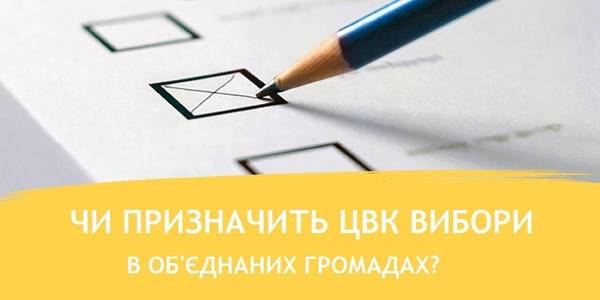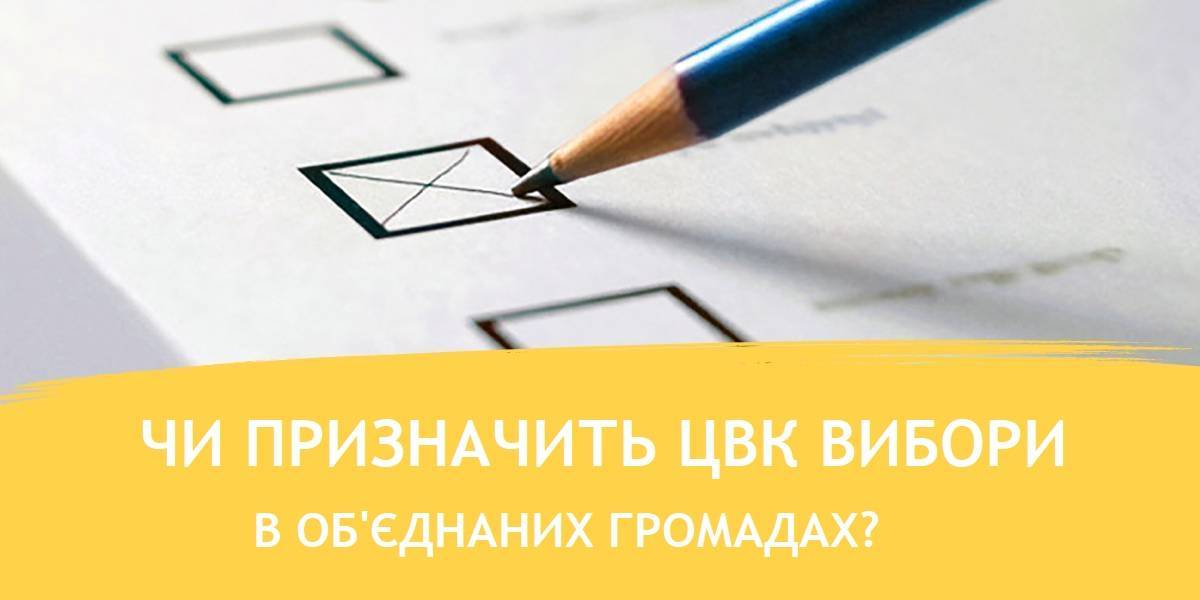Does Central Election Commission realise its responsibility for AHs' future and hundreds of thousands of people living there?
The future of the newly formed amalgamated hromadas in Ukraine is currently in the hands of the Central Election Commission. It is precisely this body which appoints the first local elections in the hromadas. And prior to the elections, it is still necessary to have time to register the hromada, prepare the first meeting of the session, form the executive committee structure and recruit staff, as well as develop provisions on the activities of the committee departments... Next steps include budget planning, transition to direct interbudgetary relations, preparation of the hromada development strategy and, at the same time, specific development projects.
Nobody has yet proved that waste of time is an effective way to develop. After all, these 40 hromadas have now to wait until the beginning of the new year to switch to direct interbudgetary relations with the state budget. It's almost a year. During this time they could solve many important issues for their residents.
So, is the Central Election Commission aware of its responsibility for the future of amalgamated hromadas and hundreds of thousands of people living there?
Decentralisation.gov.ua appealed to Andriy Mahera, deputy head of the Central Election Commission, for a comment. The answers are very general, cautious and cause even more questions. In the end, it’s up to you to judge.
“Decentralisation”: Will the elections to amalgamated hromadas be appointed this year?
Andriy Mahera: Soon the Central Election Commission will have a meeting on this, so I'm not ready to say anything about the specific dates of the local elections. I can only note that this meeting should take place this month. There the CEC members have to decide how to implement the law on the voluntary amalgamation of hromadas.
“Decentralisation”: What exactly does it mean?
Andriy Mahera: It is necessary to analyse whether the documents received are properly prepared. In addition, every supervisor of the region must tell what the situation in his region is, whether there are no court proceedings, prohibitions, etc.
“Decentralisation”: The Central Election Commission has determined by its resolution that local elections should take place on the last Sunday of October or April of each year, and electoral campaign should start 70 days before the elections. Last Sunday of October is already October 28. It turns out that the last day, when the CEC can appoint elections in AHs is August 17. Does this mean that the meeting you are talking about should happen before that date?
Andriy Mahera: I think this meeting should take place within the next ten days. I do not think that the procedure established by the CEC is alpha and omega. It is not the procedure, but the law on voluntary amalgamation of hromadas, that is the most important issue. However, in order to be as accurate as possible in everything, it is necessary to adhere to the terms defined by the CEC. Although, I repeat, in my opinion, they are not decisive.
“Decentralisation”: How many appeals to hold elections has the CEC received from future hromadas?
Andriy Mahera: A few dozen. But I am talking only about cases where the CEC received relevant submissions from the heads of oblast administrations. The media assures that in fact, there are more hromadas ready for the elections, but we should follow the procedure by which the Central Election Commission must receive a submission from the head of the oblast state administration to appoint elections in AH. Without this, the elections will not be appointed.
“Decentralisation”: May this be the case that there will be no AH elections this year?
Andriy Mahera: Let's wait for the meeting of the CEC members. Yes, there is a certain procedure defined by the Central Election Commission, and there are certain date restrictions. But at the same time, this autumn is not the last deadline, when such elections can take place. After all, the process of hromadas’ amalgamation continues uninterruptedly, and the electoral process in the newly formed AHs should be the same. Consequently, elections can be announced this year, and during the next one.
“Decentralisation”: Does the recognition of the law on all-Ukrainian referendum of Yanukovych's times as the one that does not comply with the Constitution by the Constitutional Court of Ukraine really restore the law on referendum of 1991? And will it somehow question the possibility of appointing the first local elections in AHs?
Andriy Mahera: At the next meeting, we will discuss this issue in particular. My position here is unambiguous: recognition of the 2012 law on all-Ukrainian referendum as unconstitutional does not automatically restore the 1991 law. At the same time, it can be said that legislation now has a gap in referendums’ holding. There is no such law at all.
“Decentralisation”: Will the presidential and parliamentary elections, planned to be held next year, hamper the local elections? After all, the CEC will have significant workload, and it may be too busy to deal with the elections in amalgamated hromadas.
Andriy Mahera: Local elections may well be held in parallel with the presidential and parliamentary ones. Of course, such a combination somewhat complicates the organisation of local elections, but does not make them impossible. And the law allows to hold local elections together with the presidential and parliamentary ones.
“Decentralisation”: Does this year's budget have funds to hold local elections?
Andriy Mahera: Yes, it does. Although now I'm not ready to say the exact sum.
“Decentralisation”: What is your prediction: will the elections be held in the amalgamated hromadas in autumn?
Andriy Mahera: Everything will depend on two factors: firstly, on the decisions of the Central Election Commission, and, secondly, on the quality of the documents we have received.
Decentralisation.gov.ua also asked the experts of the analytical and legal group of the Central Reform Office under MinRegion as to whether the decision of the Constitutional Court on the recognition of the Law of Ukraine “On All-Ukrainian Referendum” (No. 5475) as unconstitutional has somehow influenced the decision of the CEC to appoint local elections.
Expert Olha Lebedynska helped decentralisation.gov.ua to comprehend this situation better. Expert information is published below:
The decision of the Constitutional Court of Ukraine (CCU) No. 4-r/2018 dated 26 April 2018 recognises the Law of Ukraine “On All-Ukrainian Referendum” (No. 5475) as unconstitutional. According to Article 152 of the Constitution of Ukraine, the laws, other acts or their certain provisions, declared unconstitutional, lose validity from the date of adoption of the decision on their unconstitutionality by the Constitutional Court.
Pursuant to Articles 147-153 of the Constitution of Ukraine and the Law of Ukraine “On the Constitutional Court of Ukraine”, the CCU is not empowered to restore the laws of Ukraine, that were abolished by legislative acts as those, recognised unconstitutional by this court, and that lost their validity in this regard.
According to Article 19 of the Constitution of Ukraine, state and local self-government bodies, as well as their officials, are obliged to act only on the basis, within the powers and in the manner, provided by the Constitution and laws of Ukraine.
Thus, it is possible to state that at present the method of implementation of the provisions of Articles 69-70, 72-74 of the Constitution of Ukraine is not stipulated by the law, and there is a lack of legal regulation of both all-Ukrainian referendums since 2018 and of local ones from 2012, respectively.
It should be borne in mind that absence of such legislative norms does not preclude the implementation of other legislative acts that envisage resolution of certain issues either by another method, established by such a law, or by holding a respective referendum as an appropriate alternative.
Such legislative acts include the laws of Ukraine “On Local Self-Government in Ukraine”, “On the Rules of Procedure of the Verkhovna Rada of Ukraine” and “On Voluntary Amalgamation of Hromadas”.
In accordance with the provisions of Article 129 of the Rules of Procedure of the Verkhovna Rada of Ukraine, following the consideration of the draft law in the third reading, the Verkhovna Rada may adopt, among other options, a decision approving the text of the draft law as a whole and passing it on an all-Ukrainian referendum. The lack of legislative regulation of the procedures for holding an all-Ukrainian referendum does not deprive the Verkhovna Rada of the possibility to adopt the Law in any other way. Thus, over the period from 27 April 2018 – when the Law of Ukraine “On All-Ukrainian Referendum” was declared unconstitutional, the Verkhovna Rada of Ukraine, according to information on its portal, has adopted 33 laws, including the Laws “On the Supreme Anti-Corruption Court” and “On National Security of Ukraine” .
The Law of Ukraine “On Voluntary Amalgamation of Hromadas” (Parts 5, 7, Article 7, and Part 1, Article 8) envisages alternative options for making a decision on the voluntary amalgamation of hromadas, both through decisions made by the relevant councils and through holding of a local referendum. The lack of a legislative settlement of the referendum procedures does not deprive the hromada of the possibility to express its will in another way, envisaged by the legislation, that is, by adopting a decision on amalgamation by the relevant council.
It should be noted that since the enactment of the Law of Ukraine “On Voluntary Amalgamation of Hromadas” in March 2015 until now, 668 amalgamated hromadas have been formed. At the same time, the relevant law on conducting local referendums was abolished in 2012, even before the adoption of the Law of Ukraine “On Voluntary Amalgamation of Hromadas.
The expert summed up that the respective decision of the Constitutional Court of Ukraine, in no way affects the decision of the CEC to appoint the first elections in the newly formed AHs.

Tags:
elections amalgamation of hromadas CEC Olha Lebedynska
Source:
Прес-центр ініціативи «Децентралізація»

20 February 2026
Місцева статистика: Як перетворити розрізнені...
У Києві відбулася стратегічна зустріч "Статистика громад", організована Державною службою статистики України за...
20 February 2026
I_CAN launched a nationwide rollout of its Public Investment Management Training Programme for local governments and...
20 February 2026
Language of Development Part 2: Funds and Instruments of EU Cohesion Policy
Language of Development Part 2: Funds and...
With the “language of development”, we describe not only the goals and principles of EU regional policy, but also...
19 February 2026
Анонс: вебінар «Обговорення змін до Порядку...
Які практичні кроки мають здійснити керівники та педагоги, щоб ефективно впровадити ключові зміни до Порядку...